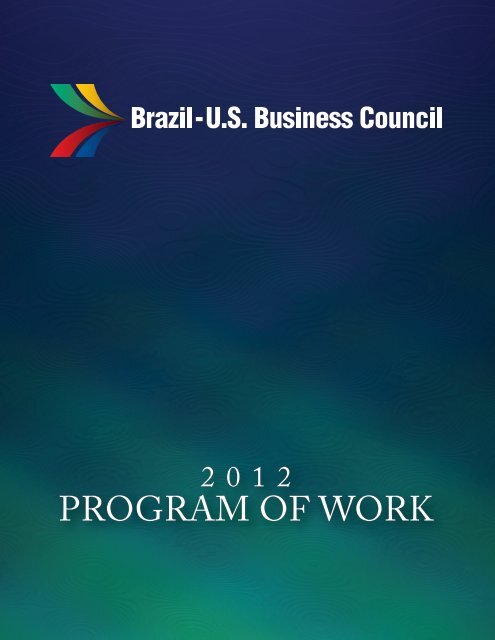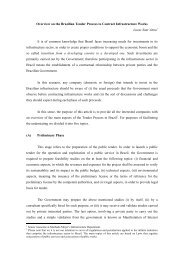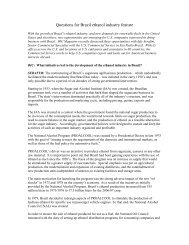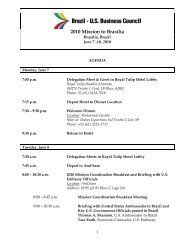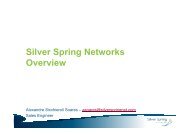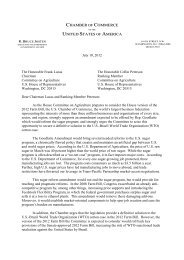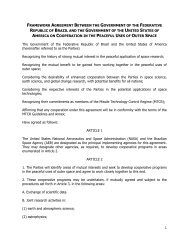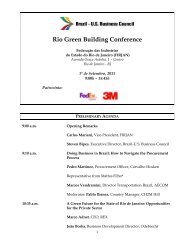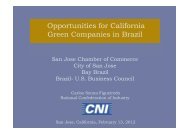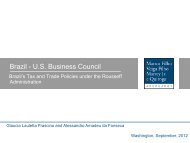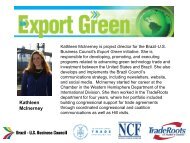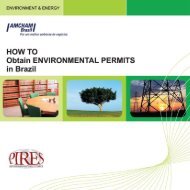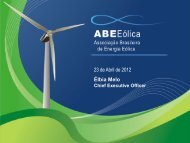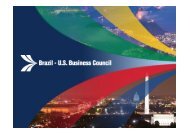PROGRAM OF WORK - Brazil-US Business Council
PROGRAM OF WORK - Brazil-US Business Council
PROGRAM OF WORK - Brazil-US Business Council
Create successful ePaper yourself
Turn your PDF publications into a flip-book with our unique Google optimized e-Paper software.
2012<br />
<strong>PROGRAM</strong> <strong>OF</strong> <strong>WORK</strong>
About Us<br />
The <strong>Brazil</strong>-U.S. <strong>Business</strong> <strong>Council</strong> (B<strong>US</strong>BC) is the premier<br />
business advocacy organization dedicated to strengthening the<br />
economic and commercial relationship between <strong>Brazil</strong> and the<br />
United States. Established in 1976, the council is composed of<br />
two sections. The U.S. Section of the council represents major U.S.<br />
companies that invest in or have business in <strong>Brazil</strong>. It operates<br />
under the administrative aegis of the U.S. Chamber of Commerce<br />
and maintains independent policy formulation and membership.<br />
The <strong>Brazil</strong> Section of the council is managed by the <strong>Brazil</strong>ian<br />
National Confederation of Industry (CNI), composed of the 27<br />
<strong>Brazil</strong>ian state-level Federations of Industries. B<strong>US</strong>BC also works<br />
in conjunction with the American Chambers of Commerce for<br />
<strong>Brazil</strong> (AmCham <strong>Brazil</strong>), the U.S.-<strong>Brazil</strong> CEO Forum, and sectoral<br />
associations in both countries. Together, this powerful structure<br />
enables the council to forge consensus between the two private<br />
sectors and communicate to both governments with a unique<br />
bilateral voice.<br />
Vision<br />
A barrier-free bilateral trade and investment relationship between<br />
<strong>Brazil</strong> and the United States that contributes to a lasting partnership<br />
with decisive influence in world politics and global governance.<br />
Mission<br />
Foster understanding among the private and public sectors in <strong>Brazil</strong><br />
and the United States to maintain and advance trade and investment<br />
between both countries through free trade, free markets, and free<br />
enterprise.<br />
Objectives<br />
Serve as an advocate in <strong>Brazil</strong> and the United States for members’<br />
interests.<br />
Promote substantive interaction between members and leading<br />
policymakers in <strong>Brazil</strong> and the United States.<br />
Deliver timely information to members and facilitate member input<br />
into policy formulation and program development.<br />
Advance members’ policy priorities through task forces, working<br />
groups, coalitions, and joint programs with government and private<br />
sector stakeholders.<br />
2012<br />
<strong>PROGRAM</strong><br />
<strong>OF</strong> <strong>WORK</strong><br />
1
<strong>Brazil</strong>-U.S. <strong>Business</strong> <strong>Council</strong> Leadership<br />
Chairman of the Board<br />
Greg Page<br />
Cargill<br />
Chairman & CEO<br />
Chair Emeritus<br />
Ambassador Anthony S.<br />
Harrington<br />
Albright Stonebridge Group<br />
President & CEO<br />
Chair’s Circle<br />
John M. Dionisio<br />
AECOM<br />
President & CEO<br />
Todd J. Teske<br />
Briggs & Stratton<br />
Chairman, CEO & President<br />
Rex Tillerson<br />
ExxonMobil<br />
Chairman & CEO<br />
Michael L. Ducker<br />
FedEx<br />
COO, Executive Vice President,<br />
President, International,<br />
FedEx Express<br />
Jeffrey R. Immelt<br />
General Electric<br />
Chairman & CEO<br />
John V. Faraci<br />
International Paper<br />
Chairman & CEO<br />
John A. Luke, Jr.<br />
MeadWestvaco<br />
Chairman & CEO<br />
Thomas F. “Mack” McLarty, III<br />
McLarty Associates<br />
President<br />
James C. Smith<br />
Thomson Reuters<br />
President & CEO<br />
Dr. Aris Candris<br />
Westinghouse<br />
Chairman & CEO<br />
Board of Directors<br />
Frederick W. Werner<br />
AECOM<br />
Executive Vice President,<br />
Global <strong>Business</strong> Lines<br />
Ian Cooling<br />
Anadarko<br />
Vice President, International<br />
<strong>Business</strong> Development<br />
Sue Cronin<br />
Apple<br />
Senior Manager, Latin America<br />
Government Affairs<br />
Julie Felgar<br />
Boeing<br />
Director, International<br />
Operations and Policy<br />
Edward Wajda II<br />
Briggs & Stratton<br />
Vice President, International<br />
Gustavo Marin<br />
Citi<br />
CEO, Citi Brasil<br />
Enrique Hidalgo<br />
ExxonMobil<br />
Director, Americas<br />
Marilyn Blanco-Reyes<br />
FedEx<br />
Vice President-Legal and<br />
Regulatory Affairs,<br />
Latin America & Caribbean<br />
Division<br />
Christopher Padilla<br />
IBM<br />
Vice President,<br />
Governmental Programs<br />
John V. Faraci<br />
International Paper<br />
Chairman & CEO<br />
Kellie Meiman<br />
McLarty Associates<br />
Managing Director<br />
John A. Luke, Jr.<br />
MeadWestvaco<br />
Chairman & CEO<br />
Mario Traverso<br />
Metlife<br />
CEO, Metlife <strong>Brazil</strong><br />
Guilherme Athia<br />
Nike<br />
Director, Public and Government<br />
Relations<br />
James C. Smith<br />
Thomson Reuters<br />
President & CEO<br />
Randolph Galm<br />
Westinghouse<br />
Vice President, Americas<br />
Marketing and Project<br />
Development<br />
Other Board-Level Member<br />
Companies<br />
Abbott Laboratories<br />
The AES Corporation<br />
Caterpillar<br />
Chevron<br />
Embraer<br />
FMC Corporation<br />
General Electric<br />
Halliburton<br />
John Deere<br />
Monsanto<br />
Raytheon<br />
2
<strong>Brazil</strong>-U.S. <strong>Business</strong> <strong>Council</strong> Members<br />
Abbott Laboratories<br />
ACE Group<br />
ADM<br />
AECOM<br />
The AES Corporation<br />
Agilent Technologies<br />
Albright Stonebridge Group<br />
Alcoa<br />
Alticor<br />
Altrius Group<br />
Amgen<br />
Anadarko<br />
Apple<br />
BAE Systems<br />
Bank of America<br />
Black & Veatch Corporation<br />
Bloomberg<br />
Boeing<br />
Brambles<br />
Briggs & Stratton<br />
Cargill<br />
Caterpillar<br />
Celanese<br />
CH2M HILL<br />
Chartis<br />
Chevron<br />
Cisco<br />
Citigroup<br />
Coca-Cola Company<br />
The Cohen Group<br />
Compass Marketing<br />
ConocoPhillips<br />
Covidien<br />
Cummins<br />
Dannemann Siemsen<br />
Dell<br />
DHL<br />
Dolby<br />
Dow Chemical<br />
Eastman Kodak Company<br />
Eisai<br />
Eli Lilly & Co.<br />
Embraer<br />
Exxon Mobil<br />
Federal Express<br />
Fluor Corporation<br />
FMC Corporation<br />
General Electric<br />
General Motors<br />
Genworth Financial<br />
GlaxoSmithKline<br />
Guardian Industries<br />
Halliburton<br />
Hewlett-Packard<br />
Honeywell<br />
IBM<br />
Illinois Tool Works<br />
Intel<br />
International Paper<br />
John Deere<br />
Johnson & Johnson<br />
Lockheed Martin<br />
LORD Corporation<br />
MasterCard Worldwide<br />
Mattos Filho<br />
Mayer Brown<br />
McLarty Associates<br />
MeadWestvaco<br />
Medtronic<br />
Merck<br />
MetLife<br />
Monsanto Company<br />
Motorola Solutions<br />
Navistar<br />
Newscorp<br />
Nike<br />
Northrop Grumman<br />
Novus<br />
Oil States<br />
Oracle<br />
PATRI<br />
Patton Boggs<br />
Pelican Energy Consultants<br />
PepsiCo<br />
PerkinElmer<br />
Pfizer<br />
Philip Morris International<br />
Praxair<br />
Qualcomm<br />
Raytheon Company<br />
Research In Motion<br />
Shell Oil Company<br />
Thomson Reuters<br />
Time Warner<br />
Trimas Corporation<br />
United Parcel Service<br />
UTC Power<br />
Viacom<br />
Visa<br />
Warburg Pincus<br />
Westinghouse<br />
Whirlpool<br />
Xerox<br />
3
CONTENTS<br />
Programs ........................................................ 5<br />
<strong>Business</strong> Intelligence ............................................... 6<br />
Policy Advocacy ................................................... 7<br />
Process. ................................................... 7<br />
Classification ............................................... 7<br />
Issues .......................................................... 8<br />
Defense & Security .......................................... 8<br />
Energy & Environment. ...................................... 8<br />
Innovation ................................................. 9<br />
Tax & Investment ........................................... 9<br />
Trade Facilitation. .......................................... 10<br />
BRAZTAC ..................................................... 11<br />
2010–2011 Achievements ...........................................12<br />
Export Green .................................................... 13<br />
Key Events ...................................................... 14<br />
Partners ........................................................ 16<br />
Staff .......................................................... 17<br />
4
Programs<br />
The <strong>Brazil</strong>-U.S. <strong>Business</strong> <strong>Council</strong> has three regular programs that take place<br />
every year: the Strategic Planning Meeting, the annual <strong>Brazil</strong> Mission, and<br />
the Plenary Meeting. It also has the <strong>Brazil</strong> Forum Series, an ongoing series<br />
of events, and in 2011, launched the U.S.-<strong>Brazil</strong> <strong>Business</strong> Summit.<br />
Strategic Planning Meeting & Mid-Year Review<br />
The annual Strategic Planning Meeting convenes members from the U.S.<br />
Section of the <strong>Brazil</strong>-U.S. <strong>Business</strong> <strong>Council</strong> to establish the organization’s<br />
strategies and tactics for the coming year and to ensure that each<br />
company’s priorities are incorporated into the council’s program of work.<br />
These priorities are revised during the Mid-Year Review.<br />
Annual <strong>Brazil</strong> Mission<br />
B<strong>US</strong>BC annually hosts one or more missions to <strong>Brazil</strong> that bring together<br />
high-level executives from U.S. member companies and their <strong>Brazil</strong>ian<br />
counterparts to meet with <strong>Brazil</strong>ian senior government officials from all<br />
branches of government at the federal, state, and local levels. B<strong>US</strong>BC<br />
missions advance the council’s program of work and help council members<br />
identify customers, partners, and opportunities in <strong>Brazil</strong>.<br />
President Barack Obama speaks to<br />
the <strong>Brazil</strong>-U.S. <strong>Business</strong> <strong>Council</strong><br />
and the larger U.S. and <strong>Brazil</strong>ian business<br />
community at the U.S.-<strong>Brazil</strong> <strong>Business</strong><br />
Summit. President Obama acknowledged<br />
the need to strengthen economic ties<br />
between the United States and <strong>Brazil</strong> to<br />
create jobs and business opportunities for<br />
both countries.<br />
Plenary Meeting<br />
B<strong>US</strong>BC’s Plenary Meeting is its annual major event that brings together<br />
the two sections of the council to measure progress in advancing its<br />
goals and laying the groundwork for cooperation in the coming year. The<br />
B<strong>US</strong>BC Plenary is the top forum for substantive public-private discussions<br />
on the <strong>Brazil</strong>-U.S. economic and commercial relationship and is held in<br />
alternate years in <strong>Brazil</strong> and the United States.<br />
<strong>Brazil</strong> Forum Series<br />
<strong>Brazil</strong> Forum is the council’s event series featuring high level public and<br />
private sector authorities from both <strong>Brazil</strong> and the United States to foster<br />
in-depth discussions of developments in the growing bilateral commercial<br />
and economic relationship. With more than 30 events annually, the <strong>Brazil</strong><br />
Forum Series provides members with opportunities to network with<br />
policymakers and business leaders.<br />
<strong>Brazil</strong>’s Finance Minister Guido Mantega<br />
speaks at the 2011 <strong>Brazil</strong> Economic<br />
Conference on <strong>Brazil</strong>’s current economic<br />
scenario and the global economy.<br />
2012<br />
<strong>PROGRAM</strong><br />
<strong>OF</strong> <strong>WORK</strong><br />
5
U.S.-<strong>Brazil</strong> <strong>Business</strong> Summit<br />
The U.S.-<strong>Brazil</strong> <strong>Business</strong> Summit is a major gathering<br />
of business and political leaders on the occasions of<br />
meetings between the presidents of the United States<br />
and <strong>Brazil</strong>.<br />
The <strong>Brazil</strong>-U.S. <strong>Business</strong> <strong>Council</strong>, in conjunction<br />
with the <strong>Brazil</strong>ian National Confederation of Industry<br />
(CNI) and the American Chambers of Commerce<br />
for <strong>Brazil</strong> (AmCham <strong>Brazil</strong>) hosted the first<br />
U.S.-<strong>Brazil</strong> <strong>Business</strong> Summit on March 19, 2011.<br />
President Barack Obama addressed this historic<br />
event that gathered American and <strong>Brazil</strong>ian business<br />
leaders to explore progress and goals in the commercial<br />
relationship.<br />
President Obama acknowledged the need to<br />
strengthen economic ties between the United States<br />
and <strong>Brazil</strong> to create jobs and business opportunities<br />
for both countries. The president noted that “there is<br />
no question that the United States and <strong>Brazil</strong> benefit<br />
from the economic ties we’ve developed over the years.<br />
There’s no question that strengthening those ties would<br />
be a win-win for both our nations.”<br />
Further information about the U.S.-<strong>Brazil</strong> <strong>Business</strong><br />
Summit can be found at www.brazilcouncil.org/summit.<br />
<strong>Business</strong> Intelligence<br />
The <strong>Brazil</strong>-U.S. <strong>Business</strong> <strong>Council</strong> helps members<br />
explore business opportunities in <strong>Brazil</strong>. It provides<br />
information and advice on the state of play, structure,<br />
influence, and key stakeholders in the public and<br />
private sectors in both countries.<br />
Additionally, the <strong>Brazil</strong>-U.S. <strong>Business</strong> <strong>Council</strong> offers<br />
members the following major sources of executive<br />
business intelligence:<br />
News Alerts<br />
The News Alerts, delivered to members upon<br />
request, provide up-to-date information about key<br />
developments in <strong>Brazil</strong>ian economics and politics<br />
having substantial impact on members’ businesses.<br />
<strong>Brazil</strong> Bulletin<br />
The <strong>Brazil</strong> Bulletin, delivered to members weekly, is<br />
a highly regarded executive summary of the latest<br />
<strong>Brazil</strong>ian business, economic, and political news.<br />
It features exclusive interviews with policy and<br />
opinion leaders on major issues of interest and<br />
includes a calendar of <strong>Brazil</strong>ian government and<br />
congressional events.<br />
<strong>Business</strong> leaders from the <strong>Brazil</strong>ian and U.S. private sector assemble with President Barack Obama at the<br />
U.S.-<strong>Brazil</strong> <strong>Business</strong> Summit.<br />
6
Policy Advocacy<br />
Process<br />
The <strong>Brazil</strong>-U.S. <strong>Business</strong> <strong>Council</strong> develops advocacy positions through<br />
dialogue with its members. B<strong>US</strong>BC governance addresses members<br />
priorities and issues through its policy committees.<br />
Each B<strong>US</strong>BC committee develops background and position papers<br />
on all policy issues relevant to its scope. Committee membership is<br />
voluntary, and each group is chaired by one or more members. B<strong>US</strong>BC<br />
currently has five task forces, six working groups, and co-leads one broadbased<br />
coalition, as follows:<br />
• Defense & Security<br />
• Energy & Environment<br />
• Green Technology<br />
• Oil & Gas<br />
• Innovation<br />
• Tax & Investment<br />
• Trade Facilitation<br />
• Customs Modernization<br />
• Infrastructure<br />
• Regulatory Issues & Standards<br />
• Retail & Consumer Products<br />
• BRAZTAC<br />
Thomas A. Shannon Jr., U.S. Ambassador<br />
to <strong>Brazil</strong>, addresses the <strong>Brazil</strong>ian private<br />
sector during a B<strong>US</strong>BC business mission in<br />
São Paulo.<br />
Classification<br />
Each policy issue is classified based on its nature in one of four<br />
categories:<br />
Multilateral (MLT) issues do not depend exclusively on action by either<br />
the government of <strong>Brazil</strong> or the U.S. government but rather require<br />
accession or adhesion to, or acceptance of, multilateral organizations,<br />
treaties, or standards. Examples include completion of the World Trade<br />
Organization (WTO) Doha Round and accession of <strong>Brazil</strong> to the WTO<br />
Government Procurement Agreement (GPA).<br />
Bilateral (BLT) issues depend exclusively on action by both the<br />
government of <strong>Brazil</strong> and the U.S. government or are bilateral in nature,<br />
despite depending on only one government’s action. Examples include<br />
negotiation of a U.S.-<strong>Brazil</strong> Bilateral Tax Treaty (BTT) and inclusion of<br />
<strong>Brazil</strong> in the U.S. Visa Waiver and Global Entry Programs.<br />
Government of <strong>Brazil</strong> (GOB) related issues depend exclusively on action<br />
by the government of <strong>Brazil</strong>, whether legislative or regulatory in nature.<br />
Examples include reduction or elimination of the 60% import tariff<br />
applied by <strong>Brazil</strong> on express delivered goods and reduction or elimination<br />
of discriminatory restrictions against foreign insurance and reinsurance<br />
companies operating in <strong>Brazil</strong>.<br />
<strong>Brazil</strong>ian Ambassador to the United States<br />
Mauro Vieira meets with members of the<br />
B<strong>US</strong>BC to discuss <strong>Brazil</strong>-U.S. relations and<br />
priorities for the bilateral agenda at a <strong>Brazil</strong><br />
Forum event.<br />
2012<br />
<strong>PROGRAM</strong><br />
<strong>OF</strong> <strong>WORK</strong><br />
7
U.S. Government (<strong>US</strong>G) related issues depend<br />
exclusively on action by the U.S. government,<br />
whether legislative or regulatory in nature.<br />
Examples include a definitive solution to the WTO<br />
cotton dispute in the context of the 2012 Farm Bill<br />
as well as to the WTO orange juice dispute.<br />
Issues<br />
The <strong>Brazil</strong>-U.S. <strong>Business</strong> <strong>Council</strong> advocates on behalf<br />
of its members in the following policy priorities:<br />
Defense & Security<br />
• Ensure that the implementation of the 2008<br />
<strong>Brazil</strong>ian National Defense Strategy includes<br />
business opportunities for members. GOB<br />
• Identify business opportunities in <strong>Brazil</strong> in<br />
surveillance, cargo risk assessment, event<br />
security (especially in connection with the 2014<br />
World Cup and the 2016 Olympics in Rio de<br />
Janeiro), and other security-related fields. GOB<br />
• Monitor and communicate trends in policies<br />
in the area of cybersecurity. BLT<br />
• Promote changes to U.S. export controls<br />
and technology release policies that would<br />
contribute to increased bilateral trade and<br />
investment flows with <strong>Brazil</strong>. <strong>US</strong>G<br />
• Support the negotiation of a Joint Aviation<br />
Program ( JAP) between <strong>Brazil</strong> and the United<br />
States. BLT<br />
• Support the U.S. bid in the <strong>Brazil</strong>ian F-X2<br />
program. GOB<br />
Energy & Environment<br />
• Support U.S. and <strong>Brazil</strong> bilateral and<br />
multilateral efforts to harmonize international<br />
biofuels standards. MLT<br />
• Support the negotiation of a new Civil<br />
Nuclear Agreement between <strong>Brazil</strong> and<br />
the United States to foster industrial and<br />
commercial cooperation. BLT<br />
• Promote the development of <strong>Brazil</strong>ian<br />
standards and conformity assessment systems<br />
for energy efficient windows. GOB<br />
• Support the free trade of ethanol between<br />
<strong>Brazil</strong> and the United States. GOB/<strong>US</strong>G<br />
• Urge the <strong>Brazil</strong>ian National Congress to create<br />
a public fund to finance researchers on wind<br />
and solar energy. GOB<br />
• Promote the protection of green patents,<br />
including clean energy patents, through<br />
increased <strong>US</strong>PTO-INPI (Instituto Nacional<br />
da Propriedade Intelectual) cooperation. GOB<br />
• Work with both governments to secure an<br />
accelerated approval mechanism for highskilled<br />
energy-related professionals’ visas. BLT<br />
• Promote changes in the <strong>Brazil</strong>ian<br />
pre-salt regulatory framework to foster<br />
U.S. investment in <strong>Brazil</strong>, including with<br />
regard to exclusivity rights and local content<br />
requirements. GOB<br />
• Work with the <strong>Brazil</strong>ian government to<br />
ensure that the price of electricity and natural<br />
gas does not prevent new U.S. investment in<br />
<strong>Brazil</strong>. GOB<br />
• Support the procurement of green products,<br />
services, and technologies by <strong>Brazil</strong>ian federal,<br />
state, and local governments. GOB<br />
• Secure <strong>Brazil</strong>ian National Congress approval<br />
and funding for public investment in nuclear<br />
energy, particularly the building of new plants<br />
and investment to expand the life cycle of<br />
existing reactors. GOB<br />
• Ensure that the implementation of federal<br />
legislation and regulations for recycling,<br />
reverse logistics, and post-recycling programs<br />
in <strong>Brazil</strong> is based on international best<br />
practices. GOB<br />
• Secure the creation of technical norms and<br />
an appropriate funding mechanism for Smart<br />
Grid implementation in <strong>Brazil</strong>. GOB<br />
• Support the work of the Strategic Energy<br />
Dialogue (SED), including through<br />
permanent and institutionalized private sector<br />
participation. BLT<br />
8
• Support U.S.-<strong>Brazil</strong> trilateral energy-related cooperation with countries in<br />
Africa, Latin America, and the Caribbean. BLT<br />
Innovation<br />
• Support the <strong>Brazil</strong>ian private sector-led <strong>Brazil</strong> IP Coalition. GOB<br />
• Work with the <strong>Brazil</strong>ian government to ensure a robust broadband<br />
policy. GOB<br />
• Oppose efforts to weaken intellectual property rights as a result of the<br />
issuance or implementation of compulsory licenses and help facilitate<br />
dialogues to prevent them from being issued. GOB<br />
• Avoid erosion of intellectual property rights protection and of<br />
promotion in the <strong>Brazil</strong>ian Copyright Law reform process as well as in<br />
the approval of the <strong>Brazil</strong>ian Internet Civil Framework Law. GOB<br />
Deputy Secretary of Energy Daniel B.<br />
Poneman (right) talks to members of the<br />
<strong>Brazil</strong>-U.S. <strong>Business</strong> <strong>Council</strong> in preparation<br />
for the launch of the U.S.-<strong>Brazil</strong> Strategic<br />
Energy Dialogue.<br />
• Raise awareness of the importance of intellectual property rights<br />
promotion and protection. GOB<br />
• Support the implementation of the Patent Prosecution Highway<br />
(PPH) agreement between <strong>Brazil</strong> and the United States. BLT<br />
• Support the creation of a tax credit or exemption to foster corporate<br />
workforce training programs in <strong>Brazil</strong>. GOB<br />
• Avoid <strong>Brazil</strong>ian intellectual property rights-related trade retaliation<br />
connected to the WTO cotton case. <strong>US</strong>G<br />
Tax & Investment<br />
• Support the negotiation of a Bilateral Tax Treaty (BTT) between<br />
<strong>Brazil</strong> and the United States. BLT<br />
<strong>Brazil</strong>’s Energy and Mines Vice<br />
Minister Marcio Zimmermann delivers<br />
opening remarks at the U.S.-<strong>Brazil</strong><br />
<strong>Business</strong> Summit.<br />
• Support the approval of the U.S.-<strong>Brazil</strong> Tax Information Exchange<br />
Agreement (TIEA) by the <strong>Brazil</strong>ian Federal Senate. GOB<br />
• Support <strong>Brazil</strong>ian government efforts to update its Transfer Pricing<br />
Law. GOB<br />
• Secure <strong>Brazil</strong>ian National Congress approval of the Tax Mediation Bill<br />
(TMB). GOB<br />
• Oppose discriminatory policies in the areas of insurance and<br />
reinsurance. GOB<br />
• Encourage <strong>Brazil</strong> membership to the Organization for Economic<br />
Cooperation and Development (OECD). MLT<br />
• Promote discussions of a potential Bilateral Investment Treaty (BIT)<br />
between <strong>Brazil</strong> and the United States. BLT<br />
Carlos Cavalcanti, infrastructure<br />
director of the Federation of Industry<br />
of the State of São Paulo (FIESP),<br />
discusses the bilateral energy<br />
relationship with council delegation<br />
members at a FIESP-hosted breakfast.<br />
2012<br />
<strong>PROGRAM</strong><br />
<strong>OF</strong> <strong>WORK</strong><br />
9
B<strong>US</strong>BC members, along with representatives of the<br />
business community and government officials, discuss the<br />
bilateral energy relationship prior to the launch of the U.S.-<br />
<strong>Brazil</strong> Strategic Energy Dialogue.<br />
(Left to right) Gabriel Rico, CEO of the American Chamber<br />
of Commerce for <strong>Brazil</strong> (AmCham <strong>Brazil</strong>); Robson Andrade,<br />
president of <strong>Brazil</strong>’s National Confederation of Industry;<br />
and Steven Bipes then-executive director of B<strong>US</strong>BC, gather<br />
before the U.S.-<strong>Brazil</strong> <strong>Business</strong> Summit.<br />
Trade Facilitation<br />
• Encourage airport and seaport cargo<br />
infrastructure improvements. BLT<br />
• Support the conclusion of the WTO Doha<br />
Round. MLT<br />
• Work with the <strong>Brazil</strong>ian government to continue<br />
modernizing <strong>Brazil</strong>’s express delivery system (EDS).<br />
• Encourage dialogue between both countries on a<br />
potential free trade agreement (FTA). BLT<br />
• Work with the U.S. Congress and the<br />
administration to protect the 2010 U.S.-<strong>Brazil</strong><br />
temporary agreement on cotton, as well as to<br />
secure a definitive solution to the WTO dispute<br />
in the context of the 2012 Farm Bill. <strong>US</strong>G<br />
• Secure the recognition of Cachaça as a distinct<br />
product of <strong>Brazil</strong> by the U.S. government. <strong>US</strong>G<br />
• Secure the recognition of Tennessee Whiskey and<br />
Bourbon as distinct products of the United States<br />
by the <strong>Brazil</strong>ian government. GOB<br />
• Promote the accession of <strong>Brazil</strong> to the WTO<br />
Information Technology Agreement (ITA). MLT<br />
• Promote the accession of <strong>Brazil</strong> to the WTO<br />
Government Procurement Agreement (GPA).<br />
MLT<br />
• Support the inclusion of remanufactured goods<br />
in the <strong>Brazil</strong>ian legal framework as well as a more<br />
open import regime for these products. GOB<br />
• Promote the accession of <strong>Brazil</strong> to the World<br />
Customs Organization (WCO) Revised Kyoto<br />
Convention. MLT<br />
• Promote joint collaboration on the removal of<br />
trade barriers in third countries. BLT<br />
• Secure the inclusion of <strong>Brazil</strong> in the Visa Waiver<br />
Program (VWP). BLT<br />
• Secure the publishing of both the proposed and<br />
final rules to open the U.S. market to <strong>Brazil</strong>ian<br />
beef as agreed on by both countries in the<br />
context of the 2010 U.S.-<strong>Brazil</strong> temporary cotton<br />
agreement. <strong>US</strong>G<br />
• Promote in <strong>Brazil</strong> regulatory transparency and<br />
harmonization of current regulatory processes and<br />
practices at the federal level. GOB<br />
• Work with the U.S. Administration to secure a<br />
definite solution to the WTO orange juice case. <strong>US</strong>G<br />
10
BRAZTAC<br />
The <strong>Brazil</strong> Trade Action Coalition’s (BRAZTAC) mission is to engage<br />
the U.S. Congress and the administration in support of policies that<br />
stimulate trade and investment between the United States and <strong>Brazil</strong>. It<br />
is made up of a broad range of agricultural, manufacturing, services, and<br />
technology businesses and trade associations representing the majority<br />
of sectors of the U.S. economy and is staffed by B<strong>US</strong>BC.<br />
BRAZTAC addresses a number of issues, foremost among them<br />
being the WTO cotton dispute, which, if it results in trade retaliation<br />
by <strong>Brazil</strong>, will undermine the broader relationship between the two<br />
countries. The coalition pursued a concerted outreach strategy to key<br />
members of Congress and the U.S. and <strong>Brazil</strong>ian governments urging<br />
productive negotiations toward a swift solution to the dispute that<br />
resulted in a temporary agreement.<br />
The 2010 U.S.-<strong>Brazil</strong> temporary agreement avoided the imposition of<br />
almost <strong>US</strong>$1 billion in <strong>Brazil</strong>ian trade retaliation against U.S. goods and<br />
intellectual property rights. The amount of authorized retaliation is the<br />
second largest in the history of the WTO.<br />
United States Representative<br />
Ambassador Ron Kirk (center) discusses<br />
the bilateral trade relationship with<br />
members of the B<strong>US</strong>BC delegation in<br />
Rio de Janeiro, <strong>Brazil</strong>.<br />
The agreement rests on five pillars: (1) initial adjustments to the U.S.<br />
Export Credit Guarantee Program (GSM-102), (2) transfer of technical<br />
assistance and capacity-building funds to <strong>Brazil</strong>, (3) actions on pending<br />
trade issues, (4) monitoring of the commitments and regular discussions<br />
between both countries, and (5) a definitive solution to the dispute.<br />
The key elements of these pillars are embodied in a 2010 U.S.-<strong>Brazil</strong><br />
Memorandum of Understanding (MOU) and a U.S.-<strong>Brazil</strong> Framework<br />
Agreement.<br />
BRAZTAC’s key goal is to engage members of Congress on the<br />
importance of complying with the temporary agreement while working<br />
toward a definitive solution to the dispute in the context of the 2012<br />
Farm Bill. To that end, the coalition has consistently and effectively<br />
opposed any measure that would dismantle the agreement, including<br />
legislative efforts in the form of the First Kind Amendment (February<br />
2011), the DeLauro Amendment (May 2011), and Second Kind<br />
Amendment ( July 2011), and the McCain Amendment (October 2011).<br />
All of these amendments would stop U.S. payments to <strong>Brazil</strong>, thus<br />
undermining the agreement and triggering trade retaliation against U.S.<br />
goods and intellectual property rights.<br />
Further information about BRAZTAC activities and the WTO cotton<br />
dispute can be found on the <strong>Brazil</strong>-U.S. <strong>Business</strong> <strong>Council</strong> website at<br />
www.brazilcouncil.org/BRAZTAC.<br />
(Left to right) Fred Hochberg, chairman<br />
and president of the Ex-Im Bank; Thomas<br />
A. Shannon Jr., U.S. Ambassador to <strong>Brazil</strong>;<br />
Gabriel Rico, CEO of AmCham <strong>Brazil</strong>;<br />
and Anthony Harrington, former U.S.<br />
Ambassador to <strong>Brazil</strong> and chair emeritus<br />
of B<strong>US</strong>BC, gather at an AmCham-hosted<br />
reception to launch the 2011 council<br />
<strong>Business</strong> Mission to <strong>Brazil</strong>.<br />
2012<br />
<strong>PROGRAM</strong><br />
<strong>OF</strong> <strong>WORK</strong><br />
11
2010–2011 Achievements<br />
The main policy achievements that the <strong>Brazil</strong>-U.S. <strong>Business</strong><br />
<strong>Council</strong> strongly advocated for include the following:<br />
• Approval by the <strong>Brazil</strong>ian House of<br />
Representatives of the 2007 U.S.-<strong>Brazil</strong> Tax<br />
Information Exchange Agreement (TIEA).<br />
• Approval by the <strong>Brazil</strong>ian National Congress of<br />
the 2009 Agreement on Visas implementation bill.<br />
• Signing of the 2010 Memorandum of<br />
Consultations (MOC) on Civil Aviation.<br />
• Establishment of the <strong>Brazil</strong> Trade Action<br />
Coalition (BRAZTAC).<br />
• Signing of the 2010 U.S.-<strong>Brazil</strong> temporary<br />
agreement to avoid nearly <strong>US</strong>$1 billion in<br />
<strong>Brazil</strong>ian trade retaliation against U.S. goods and<br />
intellectual property rights in connection with the<br />
WTO cotton dispute.<br />
• Opening of the U.S. market to pork from the<br />
<strong>Brazil</strong>ian state of Santa Catarina.<br />
• Establishment of an electronic express delivery<br />
processing system (Sistema Remessa) by the<br />
<strong>Brazil</strong>ian Federal Revenue Service (RFB).<br />
• Signing of the 2011 U.S.-<strong>Brazil</strong> Agreement on<br />
Trade and Economic Cooperation (ATEC).<br />
• Signing of the 2011 U.S.-<strong>Brazil</strong> Open Skies Air<br />
Transport Agreement (ATA).<br />
• Defeat of four amendments (Kind I, Kind II,<br />
DeLauro, and McCain) that would have dismantled<br />
the 2010 U.S.-<strong>Brazil</strong> temporary agreement in<br />
connection to the WTO cotton dispute.<br />
• Implementation of the World Custom Organization<br />
(WCO) Istanbul Convention in 2011.<br />
• Approval of ATA Carnet.<br />
• Renewal of the U.S. Generalized System of<br />
Preferences (GSP) with the maintenance of <strong>Brazil</strong><br />
as beneficiary country.<br />
• Elimination of the $0.54 U.S. per gallon import<br />
tariff on ethanol and the $0.45 per gallon “blenders’<br />
tax credit” subsidy.<br />
(Left to right) Eduardo Eugenio Gouvêa Vieira, president of<br />
the Federation of Industries for the State of Rio de Janeiro<br />
(FIRJAN), Eike Batista, president of EBX Group, Steven<br />
Bipes, then-executive director of the <strong>Brazil</strong>-U.S. <strong>Business</strong><br />
<strong>Council</strong>, and Sergio Cabral, Governor of the State of Rio de<br />
Janeiro gather at a <strong>Brazil</strong> Forum event.<br />
Timothy C. McManus, senior vice president and<br />
director of program management of AECOM, discusses<br />
infrastructure and financing in Rio de Janeiro, <strong>Brazil</strong>, with<br />
B<strong>US</strong>BC mission members.<br />
B<strong>US</strong>BC hosts a roundtable discussion with then-Senator<br />
Ideli Salvatti, and current <strong>Brazil</strong>ian secretary of institutional<br />
relations (second from right); Laura Lane, then-managing<br />
director and head of international government affairs,<br />
Citigroup; Julio Castro, partner, Dewey & LeBoeuf LLP (far<br />
left); and Steven Bipes, then-executive director, B<strong>US</strong>BC.<br />
12<br />
<strong>Brazil</strong>’s Finance Minister Guido Mantega (center) gathers<br />
with Steven Bipes, then-executive director of the <strong>Brazil</strong>-<br />
U.S. <strong>Business</strong> <strong>Council</strong> (right), and José Roberto Azevedo,<br />
executive director of the <strong>Brazil</strong>ian-American Chamber of<br />
Commerce, at the 2011 <strong>Brazil</strong> Economic Conference.
Export Green<br />
In his 2010 State of the Union address, President Obama called for a<br />
new, high-level effort to promote U.S. exports. The goal of the National<br />
Export Initiative (NEI) is to double U.S. exports over the next five years<br />
and support 2 million new jobs by working to remove trade barriers<br />
abroad, helping firms—especially small businesses—overcome the hurdles<br />
to entering new export markets, assisting with financing, and pursuing a<br />
government-wide approach to export promotion.<br />
To support and enhance this initiative, the <strong>Brazil</strong>-U.S. <strong>Business</strong> <strong>Council</strong><br />
and TradeRoots, affiliates of the U.S. Chamber of Commerce, have been<br />
awarded a cooperator agreement from the U.S. Department of Commerce to<br />
implement Export Green: Growing SME Exports to <strong>Brazil</strong>.<br />
Export Green, a project that aims to increase green technology exports<br />
to <strong>Brazil</strong> from small and medium-size U.S. companies, opens doors to<br />
the <strong>Brazil</strong>ian market for companies in clean energy, green construction,<br />
recycling, and other green sectors. This increase in exports will create<br />
American jobs and strengthen American competitiveness in green<br />
technology sectors.<br />
Get Involved! For further information, visit www.brazilcouncil.org/<br />
exportgreen.<br />
U.S. Assistant Secretary for Manufacturing and Services, U.S. Department of<br />
Commerce, Nicole Lamb-Hale (center), the Export Green “Green Building<br />
in <strong>Brazil</strong>” delegation, and B<strong>US</strong>BC staff visit the Petrobras University in Rio de<br />
Janeiro.<br />
2012<br />
<strong>PROGRAM</strong><br />
<strong>OF</strong> <strong>WORK</strong><br />
13
Key Events<br />
2010<br />
January 13: Private roundtable discussion with<br />
Thomas A. Shannon Jr., U.S. Ambassador to <strong>Brazil</strong><br />
(Washington, D.C.)<br />
January 22: B<strong>US</strong>BC annual advocacy mission to <strong>Brazil</strong><br />
to meet with government officials, member companies,<br />
and local partners (Brasília, <strong>Brazil</strong>)<br />
February 24: Annual B<strong>US</strong>BC Strategic Planning<br />
Meeting (Washington, D.C.)<br />
March 5: Roundtable discussion with then-Senator<br />
Ideli Salvatti, former <strong>Brazil</strong>ian Senate leader and<br />
now <strong>Brazil</strong>’s Secretary of Institutional Relations<br />
(Washington, D.C.)<br />
March 11: Roundtable discussion with Minister Luís<br />
Inácio Lucena Adams, <strong>Brazil</strong>ian Attorney General<br />
(Washington, D.C.)<br />
April 6: <strong>Brazil</strong> Forum event featuring Romeu<br />
Temporal, Chief Economic Adviser to <strong>Brazil</strong>’s<br />
Secretary of Planning; and Paulo Britto Guimarães,<br />
Superintendent in the Secretariat of Industry,<br />
Commerce, and Mining from the State of Bahia<br />
(Washington, D.C.)<br />
April 13: Event with Dr. Welber Barral, <strong>Brazil</strong>’s<br />
then-Secretary of Foreign Trade<br />
April 22: <strong>Brazil</strong> Forum event featuring Mauro<br />
Vieira, Ambassador of <strong>Brazil</strong> to the United States<br />
(Washington, D.C.)<br />
April 23: <strong>Brazil</strong> Forum event featuring Augusto<br />
Wagner Padilha Martins, Vice Minister of the <strong>Brazil</strong>ian<br />
Presidential Special Office for Port Development<br />
(Washington, D.C.)<br />
April 30: B<strong>US</strong>BC event with Under Secretary of<br />
Commerce for International Trade Francisco Sanchez<br />
(Washington, D.C.)<br />
June 7–10: Annual advocacy mission to <strong>Brazil</strong><br />
(Brasília, <strong>Brazil</strong>)<br />
July 14: <strong>Brazil</strong> Forum Roundtable featuring Dr. Jorge<br />
Ávila, President of the <strong>Brazil</strong>ian Patent and Trademark<br />
Office (INPI) (Washington, D.C.)<br />
July 15: <strong>Brazil</strong> Forum event in conjunction with the<br />
Woodrow Wilson Center’s <strong>Brazil</strong> Institute featuring<br />
14<br />
Luciano Galvão Coutinho, President of the <strong>Brazil</strong>ian<br />
National Development Bank (BNDES) (Washington,<br />
D.C.)<br />
September 7: <strong>Brazil</strong> Forum Roundtable featuring<br />
Guilherme Ramalho, Growth Acceleration Program<br />
(PAC) Coordinator and Adviser in the Office of<br />
Monitoring and Intergovernmental Affairs of the<br />
Executive Office of the President—Casa Civil<br />
(Washington, D.C.)<br />
September 24: <strong>Brazil</strong> Forum Roundtable featuring<br />
João Alziro Herz da Jornada, President of the <strong>Brazil</strong>ian<br />
National Institute for Metrology, Standardization, and<br />
Industrial Quality (INMETRO) (Washington, D.C.)<br />
September 29: Roundtable discussion on the FDA-<br />
ANVISA dialogue featuring José Gomes Temporão,<br />
<strong>Brazil</strong>’s then-Minister of Health; Dr. Dirceu<br />
Raposo, then-President of <strong>Brazil</strong>’s National Sanitary<br />
Surveillance Agency (ANVISA); and Mary Lou<br />
Valdez, Associate Commissioner for International<br />
Programs at FDA (Washington, D.C.)<br />
October 8: 2010 Economic Conference co-hosted by<br />
B<strong>US</strong>BC featuring Guido Mantega, <strong>Brazil</strong>’s Minister<br />
of Finance; Henrique Meirelles, then-President of<br />
the Central Bank of <strong>Brazil</strong>; and Luciano Coutinho,<br />
President of the <strong>Brazil</strong>ian National Development Bank<br />
(BNDES) (Washington, D.C.)<br />
November 14: Kickoff for the Export Green: Growing<br />
SME Exports to <strong>Brazil</strong> program at the America’s<br />
Competitiveness Forum (ACF) (Washington, D.C.)<br />
November 18: Roundtable on the <strong>Brazil</strong>ian presidential<br />
elections featuring <strong>Brazil</strong>’s then-Secretary for Foreign<br />
Trade Welber Barral (Washington, D.C.)<br />
December 7: B<strong>US</strong>BC Plenary meeting<br />
(São Paulo, <strong>Brazil</strong>)<br />
2011<br />
January 20: Roundtable discussion on Infrastructure<br />
and Energy Opportunities in <strong>Brazil</strong> featuring Robert<br />
D. Hormats, Under Secretary for Economic, Energy,<br />
and Agricultural Affairs (Washington, D.C.)<br />
February 11: B<strong>US</strong>BC Infrastructure and Energy<br />
mission to <strong>Brazil</strong> with Ambassador Jose Fernandez,<br />
Assistant Secretary of State for Economic, Energy, and<br />
<strong>Business</strong> Affairs (Washington, D.C.)
February 24: Annual Strategic Planning Meeting (Washington, D.C.)<br />
March 18–21: U.S.-<strong>Brazil</strong> <strong>Business</strong> mission to <strong>Brazil</strong> featuring United<br />
States Trade Representative Ambassador Ron Kirk, Ex-Im President and<br />
Chairman Fred P. Hochberg, then-Secretary of Commerce Gary Locke,<br />
and Department of Energy Assistant Secretary for Policy and International<br />
Affairs David Sandelow (Brasília, Rio de Janeiro, and São Paulo <strong>Brazil</strong>)<br />
March 19: U.S.-<strong>Brazil</strong> <strong>Business</strong> Summit featuring President Barack Obama<br />
(Brasília, <strong>Brazil</strong>)<br />
March 31: <strong>Brazil</strong> Forum event on <strong>Business</strong> Opportunities in Rio de Janeiro<br />
featuring Sérgio Cabral, Governor of Rio de Janeiro; Eike Batista, President<br />
of EBX Group; and Eugenio Gouveia Vieira, President of Federation of<br />
Industries of the State of Rio de Janeiro (FIRJAN) (Washington, D.C.)<br />
May 6: <strong>Brazil</strong> Forum Roundtable featuring Marcelo Haddad, Executive<br />
Director of the Rio Investment Promotion Agency (Rio Negócios)<br />
(Washington, D.C.)<br />
July 19: Roundtable with Brian Brisson, New Senior Commercial Officer for<br />
<strong>Brazil</strong> of the U.S. Department of Commerce (Washington, D.C.)<br />
August 10: B<strong>US</strong>BC energy roundtable featuring Deputy Secretary of Energy<br />
Daniel B. Poneman in preparation for the launch of the U.S.-<strong>Brazil</strong> Strategic<br />
Energy Dialogue (SED) (Washington, D.C.)<br />
Then-<strong>Brazil</strong>ian Health Minister Jose<br />
Gomes Temporão addresses council<br />
members at a roundtable discussion on the<br />
FDA-ANVISA Dialogue.<br />
August 28–September 2: Export Green–Trade Mission: Green Building<br />
and <strong>Brazil</strong><br />
September 23: 2011 Economic Conference co-hosted by B<strong>US</strong>BC and the<br />
<strong>Brazil</strong>ian-American Chamber of Commerce featuring <strong>Brazil</strong>’s Central Bank<br />
Governor Alexandre Tombini and <strong>Brazil</strong>’s Finance Minister Guido Mantega<br />
(Washington, D.C.)<br />
October 12: Roundtable with <strong>Brazil</strong>’s Permanent Representative to the<br />
World Trade Organization (WTO) Roberto Azevedo (Washington, D.C.)<br />
October 13: Roundtable with <strong>Brazil</strong>’s Foreign Trade Secretary Tatiana<br />
Prazeres (Washington, D.C.)<br />
November 1: Export Green–Building Envelope Energy Efficiency<br />
Technology Cooperation Workshop (São Paulo, <strong>Brazil</strong>)<br />
November 14: Roundtable with Sergio Lazzarini, Associate Professor of<br />
Organization and Strategy, <strong>Brazil</strong>ian Institute of Education and Research<br />
(INSPER) (Washington, D.C.)<br />
November 15: Export Green–Doing <strong>Business</strong> in <strong>Brazil</strong> (Atlanta, Georgia)<br />
December 2: <strong>Brazil</strong> Forum Luncheon with Senator Richard D. Lugar (R-IN)<br />
December 13–15: Export Green Buyers Mission: POWER-GEN<br />
(Las Vegas, Nevada)<br />
<strong>Business</strong> leaders and government<br />
officials wait to hear President Barack<br />
Obama’s keynote address at the<br />
U.S.-<strong>Brazil</strong> <strong>Business</strong> Summit. President<br />
Obama said “There is no question that<br />
the United States and <strong>Brazil</strong> benefit<br />
from the economic ties we’ve developed<br />
over the years. There’s no question that<br />
strengthening those ties would be a<br />
win-win for both our nations.”<br />
2012<br />
<strong>PROGRAM</strong><br />
<strong>OF</strong> <strong>WORK</strong><br />
15
Partners<br />
<strong>Brazil</strong>ian National Confederation of Industry (CNI)<br />
CNI is the home of the <strong>Brazil</strong> Section of the council and is the umbrella<br />
manufacturing sector organization in <strong>Brazil</strong>. Created in 1938, the<br />
confederation is made up of the 27 Federations of Industries from all <strong>Brazil</strong>ian<br />
states and the Federal District, and more than 1,000 sectoral employers unions<br />
representing more than 195,000 companies.<br />
American Chambers of Commerce for <strong>Brazil</strong> (AmCham <strong>Brazil</strong>)<br />
The American Chambers of Commerce for <strong>Brazil</strong> represent the subsidiaries of<br />
virtually all American companies in <strong>Brazil</strong> as well as multinationals from more<br />
than 40 countries and a great number of <strong>Brazil</strong>ian companies totaling more<br />
than 5,000 members. The AmChams are present in key <strong>Brazil</strong>ian cities and are<br />
the largest among the American Chambers of Commerce in the world.<br />
Federation of Industries of the State of São Paulo (FIESP)<br />
FIESP is the leading regional manufacturing sector organization in <strong>Brazil</strong> and<br />
is the largest <strong>Brazil</strong>ian state-level federation of industries. It is composed of<br />
131 sectoral employers’ unions representing more than 31% of the country’s<br />
industrial GDP and approximately 150,000 companies.<br />
<strong>Brazil</strong> Industries Coalition (BIC)<br />
BIC is a Washington-based trade association that represents <strong>Brazil</strong>ian<br />
companies and other <strong>Brazil</strong>ian trade organizations in the United States.<br />
Its membership is made up of trade associations from the agribusiness and<br />
manufacturing sectors, as well as leading <strong>Brazil</strong>ian companies, most of which<br />
are invested in the United States.<br />
U.S.-<strong>Brazil</strong> CEO Forum<br />
The U.S.-<strong>Brazil</strong> CEO Forum was created in 2007 by the United States and<br />
<strong>Brazil</strong>ian governments to strengthen economic and commercial ties between<br />
the two countries. The CEO Forum, made up of private and public sector<br />
representatives, convenes leaders from the United States and <strong>Brazil</strong> to form<br />
consensus on priorities in the bilateral trade and investment relationship and<br />
advance policy recommendations with both governments.<br />
In the United States, the CEO Forum is chaired by the U.S. secretary of<br />
commerce and by the deputy assistant to the president and deputy national<br />
security adviser for International Economic Affairs. In <strong>Brazil</strong>, the Forum is<br />
chaired by the presidential chief of staff (Casa Civil) and by the <strong>Brazil</strong>ian<br />
minister of development, industry, and foreign trade. Ten companies from each<br />
country participate in the forum.<br />
The <strong>Brazil</strong>-U.S. <strong>Business</strong> <strong>Council</strong> supports the U.S. Section of the CEO<br />
Forum. Visit www.brazilcouncil.org/CE<strong>OF</strong>orum for further information.<br />
16
Staff<br />
Diego Z. Bonomo<br />
Senior Director for Policy<br />
Phone: +1.202.463.5994<br />
dbonomo@uschamber.com<br />
Kathleen McInerney<br />
Director<br />
Phone: +1.202.463.5341<br />
kmcinerney@uschamber.com<br />
Tim Ridout<br />
Program Manager<br />
Phone: +1.202.463.5427<br />
tridout@uschamber.com<br />
<strong>Brazil</strong> Team<br />
Steven Bipes<br />
Chief Representative - <strong>Brazil</strong><br />
Phone: +55.21.9855.1147<br />
sbipes@uschamber.com<br />
Rafael Lourenço<br />
Manager, <strong>Business</strong> Development<br />
Rio de Janeiro<br />
Phone: +55.21.3213.9215<br />
Cell: +55.21.9579.2670<br />
rlourenco@uschamber.com<br />
Luciana Rocha-Goldman<br />
Associate, Export Green<br />
Phone: +1.202.463.5496<br />
lrochagoldman@uschamber.com<br />
Renata Vasconcellos<br />
Director for Policy<br />
Phone: +1.202.463.5628<br />
rvasconcellos@uschamber.com<br />
Reeve Wolford<br />
Senior Advisor<br />
Phone: +1.202.525.9607<br />
rwolford@uschamber.com<br />
Mariana M. Yazbek<br />
Coordinator<br />
Phone: +1.202.463.3197<br />
myazbek@uschamber.com<br />
2012<br />
<strong>PROGRAM</strong><br />
<strong>OF</strong> <strong>WORK</strong><br />
17
<strong>Brazil</strong>-U.S. <strong>Business</strong> <strong>Council</strong><br />
1615 H Street, NW | Washington, DC 20062-2000<br />
www.brazilcouncil.org<br />
www.facebook.com/<strong>Brazil</strong><strong>Council</strong><br />
@B<strong>US</strong>BC


